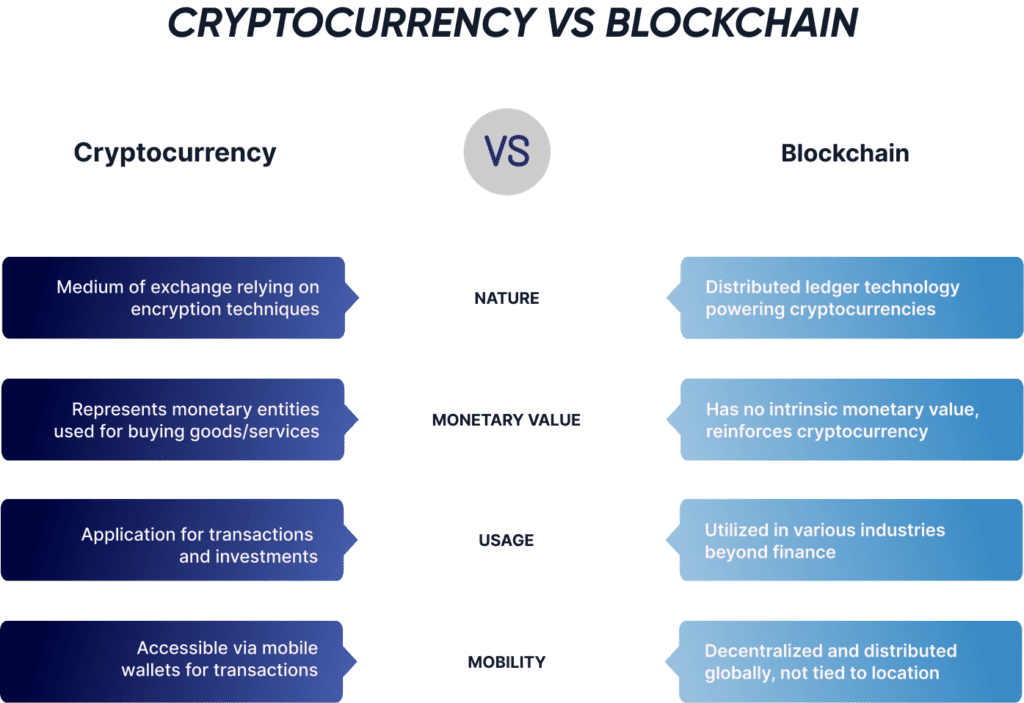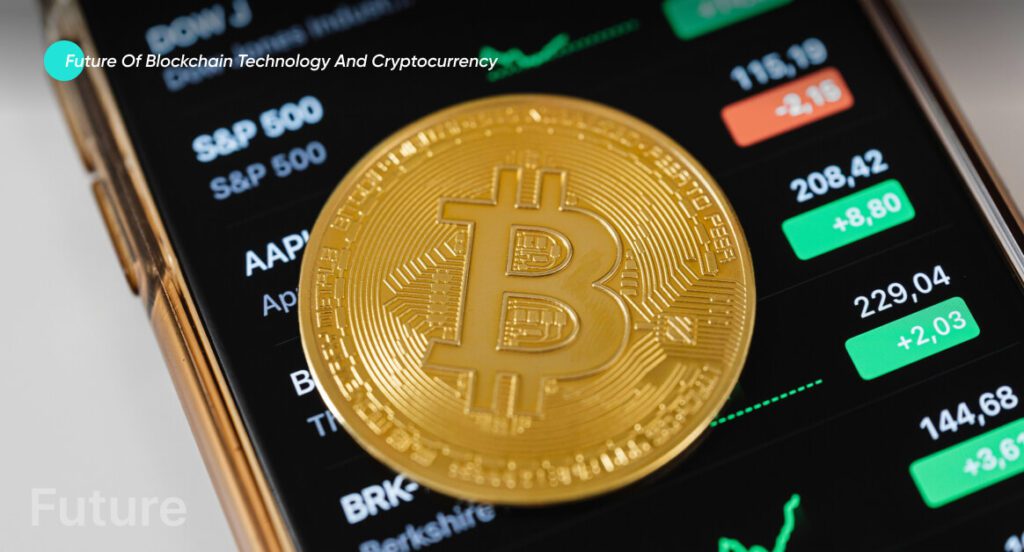Blockchain Technology vs Cryptocurrency – Key Differences
There has been a rise in the usage of blockchain over the past few years due to the popularity of Metaverse, AI, Cryptocurrency, and Virtual Reality. Despite becoming so popular, people still aren’t clear about what these digital entities are and often confuse them with one another. The same is true for Blockchain Technology and Cryptocurrency. If you’re one of the millions who use them interchangeably, it’s high time you explored Blockchain Technology vs Cryptocurrency. Understanding what sets them apart is essential in this rapidly changing technological landscape.
Before we dive into this comparative analysis, let’s first understand why these two terms are often used synonymously. Bitcoin, a popular Cryptocurrency, was the first-ever blockchain application. This was back in 2009. Fifteen years later, Blockchain technology is much more than just cryptocurrency. It caters to a wide range of industries, like banking, asset management, supply chain, voting, etc. By 2027, the global Blockchain market is expected to reach 163 billion USD! Hence, thinking Blockchain is Crypto is similar to assuming that social media is the internet.
In this blog, we will discuss the difference between crypto and blockchain in great detail.
To understand the difference between these two platforms, it is first important to understand these technologies independently.
What is Blockchain Technology?
Blockchain is an upgraded version of a database. Don’t know what a database is? An organized collection of data easily accessed and managed by relevant personnel is called a database. So, blockchain really is just a computer file for storing data!
Technically, Blockchain is an open and distributed ledger. All the data contained in a ledger (database) is distributed and duplicated across a wide range of computers, making it decentralized. This decentralization is what differentiates it from a traditional database. A conventional database typically has a central administrator. However, in blockchain, the entire ledger is transparent, and the data is always verified with user consensus.
Does this “transparency” and “decentralization” make it less secure? No. If anything, it makes it very secure and safe because there is no central point of attack for a hacker to target.
There are four types of Blockchain networks: Public, Private, Hybrid, and Consortium.
Some common modern applications of blockchain technology are:
- Smart Contract Execution
- Supply Chain Audits
- Record Maintenance
- Insurance
What is Cryptocurrency?
Cryptocurrency is a medium of exchange secured by the encryption of crypto-transactions and the control of the transactions of new units. Simply put, Cryptocurrency is digital money with market value like other popular currencies. The first cryptocurrency was Bitcoin, which paved the way for many more. Cryptocurrency uses blockchain as a ledger for storing records of crypto transactions. It enables secure transactions without the need for intermediaries like banks and other central regulatory bodies. Hence, Cryptocurrency is just one of the many applications of Blockchain Technology.
Some common examples of Cryptocurrency are:
- Bitcoin
- Ethereum
- Tether USDT
- Dogecoin
- Mantle
- Cronos
You can explore the Blockchain cryptocurrency list for more current updates.
Comparison of Blockchain Technology Versus Cryptocurrency
Now that you understand blockchain and cryptocurrency, let’s compare these technologies to better understand each other.
Similarities – Blockchain Technology & Cryptocurrency

Intangibility
Blockchain and Cryptocurrency are both intangible entities. Where Cryptocurrency is an intangible digital token or money, Blockchain can be used to store cryptocurrency in a single place or a data center (ledger).
Interdependence
Blockchain recorded transactions for Bitcoin and continues to do so. Hence, all major Cryptocurrencies are dependent on Blockchain for operationality, while Blockchain has broader applicability in a range of industries.
Both Cryptocurrency and Blockchain are tech advancements. Blockchain is the technology behind cryptocurrency. It is more advanced than secure traditional databases. Cryptocurrency is more technologically advanced than traditional or paper-based currencies.
We can help you build a scalable and functional website for your business. See our Blockchain App Development Service </b ![]()
Differences – Blockchain Technology vs Cryptocurrency

Blockchain and Cryptocurrency are buzzwords today. While many people associate them to the point that they consider them synonymous, they are, in fact, very different in nature. Their fundamental principles of operation are different.
Nature
Cryptocurrency is a medium of exchange that relies on complex encryption techniques to regulate and verify transfers. However, Blockchain is the underlying technology that powers cryptocurrency, i.e., blockchain is a distributed ledger that records any transactions securely and transparently. Hence, there is a major difference between Bitcoin and blockchain in their inherent nature.
Monetary Value
Cryptocurrency represents monetary entities, i.e., it holds monetary value. You can use it to buy products and services. Blockchain, on the other hand, has no monetary value of its own, but it reinforces cryptocurrency’s monetary nature.
Usage
Blockchain technology has a lot of uses beyond cryptocurrencies. It is used in the banking, supply chain, retail, and healthcare industries. On the other hand, cryptocurrency is an application of blockchain that can be used as a medium of exchange to buy or sell goods and services and as a viable investment medium.
Mobility
As stated above, Blockchain is decentralized and distributed worldwide. Hence, all the blockchain records are never stored in a single location. On the other hand, Cryptocurrency, although held in Blockchains, can easily be accessed via mobile wallets. You can use it anywhere for transactions with different parties.
Transparency
Blockchain Technology is highly transparent. Hence, anyone can join a Blockchain network and access the information available.
Cryptocurrency offers anonymity. Hence, anyone can see the source and destination of a Bitcoin transaction, and no one can know who’s actually behind a transaction.

Future of Blockchain Technology and Cryptocurrency

After the Blockchain vs. Cryptocurrency comparison, let’s examine the future outlook for both innovations.

1. Decentralized Finance (DeFi)
The rise of decentralized finance is a noteworthy advancement in blockchain technology. It offers a completely new way to access financial services that aren’t dependent on traditional banks and financial institutions. This helps people borrow, lend, and trade without any intermediaries, ultimately making financial transactions more accessible and affordable.

2. Non-Fungible Assets (NFTs)
NFTs are expected to make a comeback this year. With a wide resurgence of interest in NFTs, brands were buying and selling their NFTs in major brick-and-mortar stores in 2023. However, experts say that the next wave of successful NFT products will probably look very different from what we’ve all seen before. Instead of being produced in small quantities, these products will be produced in large numbers and sold at affordable prices. Hence, a broader consumer market will be targeted.
Hence, NFTs will focus on direct value creation instead of speculation!

3. Mainstream Adoption
The 2020s have seen the rapid adoption of blockchain technology worldwide. Government bodies and global businesses have incorporated it into their mainstream operations. Blockchain helps them create secure, transparent, and cost-effective entities.

4. Decentralized Autonomous Organizations (DAOs)
DAOs were created as a result of decentralized blockchain technology. These virtual organizations launch projects without central authority and run themselves with their own rules. There are hundreds of different DAOs that are creating identity management tools, pseudo-anonymity solutions, and wallets to hold identities and tokens.
Moreover, DAOs are forming relationships with government bodies. The EU is preparing to launch a comprehensive overhaul for crypto assets via MiCA. Hence, when a DAO issues crypto tokens that are being sold in the EU, they will have to comply with the financial regulations contained in MiCA.
Wrapping Up
Here’s all you need to know about the popular Blockchain Technology vs Cryptocurrency debate! We gave you insight into the key similarities and differences between these entities and a little peek into the future of Blockchain and Cryptocurrency. Both of these technologies hold transformative possibilities and offer opportunities for a more secure, inclusive, and transparent digital economy.
Have any questions about them? Talk to our experts!
FAQs
Blockchain and cryptocurrency are closely related concepts, but they aren’t the same. Blockchain is a digital medium of exchange and the underlying concept behind the functionality of cryptocurrency.
Yes, you can invest in Blockchain without investing in Cryptocurrency. Some ways are investing in public companies that are involved in blockchain, participating in crowdfunding a new cryptocurrency through ICO or buying an exchange-traded fund (ETF).
Any blockchain network that is not owned by a corporate entity is likely a decentralized network
Masifa is a Content Specialist with a bachelor’s degree in marketing and over three years of experience in content marketing and the IT industry. She is passionate about writing and talking about website and mobile app development, e-commerce, and advancements happening in the IT Industry. She creates engaging and user-centric content to optimize digital experiences for these niches. When she is not creating content, you can find her buried in a good book.